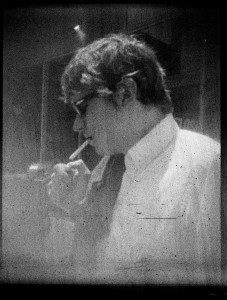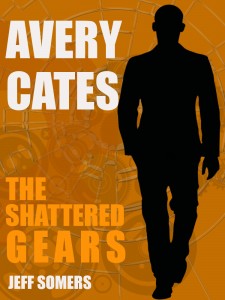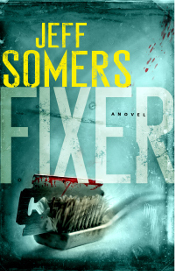This story was originally published in Brutarian Quarterly 48/49.
WE KNEW the old green house on the northeast corner of the intersection as the Gooly House, because in the dim recesses of our young minds we all knew that Mrs. Gooly, whom we had feared and hated, had lived there for some years, keeping our errant tennis balls, frisbees, and gliders, a reign of tyranny over our childhoods. We’d hated Mrs. Gooly, because she insisted we stay outside her low, crumbling stone fence, because she wouldn’t let us reclaim our lost toys, because she snitched to our parents whenever we did anything in her sight, because she smelled slightly of dust at all times. We called her Mrs. Ghouly, not very original, but appropriate enough, and fought the urge to run past her house, forcing ourselves to walk sedately, untroubled by an obvious witch in our midst.
The house was mysterious. Three floors, with wickedly peaked roofs, and a dark, mulchy green. The windows were always shuttered, giving it a blind, moon-faced appearance. The yard surrounded it like a moat, a continuous band of green, overgrown to the extreme with odd plants we didn’t see in any other yard, a narrow path of slate leading from the slumped gate to the front door. The stone fence was only about three feet high, and was of a chalky substance we weren’t sure was really stone. It could be vaulted with one well-timed jump, unless you were Clarence from four doors down who was fat and always split his pants. We were terrified of the Gooly House, and of Mrs. Gooly, and we were shocked, and distrustful, when informed that she had passed away.
For weeks we feared ghosts. The house looked exactly the same; shuttered, moldy, brooding. Mrs. Gooly, being the undead, had no family that anyone knew of, so her spirit was free, we were convinced, to roam the house as she had in life, except, certainly, with new untold powers of evil. We crept past it, an eye out for black magic, and didn’t find out that someone had bought the house until the daring daylight raid we planned, almost a year after Mrs. Gooly’s demise.
A year is a long time in childhood. A whole slate of holidays had come and gone, a whole school year. Mrs. Gooly faded into the past, and if we still moved quicker when passing her looming green house, we didn’t do it consciously anymore. As she faded from fearsome witch to crabby old lady who used to live there, the neighborhood kids began more and more to look longingly towards the uncharted reaches of the Gooly House, where years’ worth of sporting goods lay waiting in the dim recesses of the tall grass, on the slightly slanted roof, in the gutters. Even after a year it took some weeks for us to come up with the combined courage to plan and execute a raid on the Gooly house.
There were five of us in charge. Myself, so pale I was almost invisible, and thin and known as the fastest runner on the block, a boy who fought back challengers every week, defeating kids from whole other neighborhoods in races; there was Rapheal, Rafe, who was my polar opposite: deeply tan, with dark hair and a muscular build, even at that age, that I envied; Marcia, who would, three years later, be my first kiss, but who was then just a freckled, red-haired, skinny girl who sometimes punched us in the shoulders for no reason; Lewis, deceptively nerdy in his thick, taped-up glasses; and Tanya, bossy, always bruised, who stole from us whenever we accidentally let her into our houses. Over grape sodas and Flav-or-Ice, we began by idly discussing how many balls we had lost at the Gooly house, and slowly devised a plan which we figured would net thousands of dollars in rubber and plastic – what we planned to do with all those toys, I couldn’t say. It was just a challenge.
The details of the plan were as follows:
The raid would be conducted during daylight, because even if we were bigger kids than ever, there was no way we were going into the Gooly house in the dark – I would challenge you today to do so, and you’d make some excuse up. We would enter the Gooly house perimeter from Webster Street through the King’s yard – the Kings were tolerant of us using their yard as a shortcut through the neighborhood, and this would allow us to enter the Gooly house perimeter without being observed by any stray parents who might have wandered from the house. Our parents never left the house during the day on a weekend, we knew that, although we couldn’t figure out why. Dads stayed in their easy chairs watching sports, Moms did whatever Moms did, mysterious things we didn’t want any part of. While unlikely that any of them would be seen on the streets, we didn’t want to take chances. Finally, we would start on the roof, beginning with the most dangerous and vulnerable area and working our way downward into the concealing safety of the tall grass, the myserious, lush jungle of the untended yard.
We crashed over the Kings’ fence boldly, trying to impress whatever ghosts there might be with our lack of fear. The house loomed before us as it always had – forbidding, not so much dark as a lack of light in the shape of a house- only closer. The siding was water-damaged, and we discovered to our mild surprise that part of the deep green color of the house was a thriving ivy plant that was consuming it, slowly. I remember we stood there, staring at it, for a few seconds, and then Marcia snorted in derision at men in general and began hoisting her slim frame up the side of the house, which was actually pretty easy; the small shed outside the back door gave easy purchase for the porch window sill, which was a quick lunge away from the porch roof, which was in turn just a few seconds of huffing and puffing from the second story roof, which, we theorized, was the pot of gold. And then, unexpected, an adult voice.
“What the hell are you kids doing back here?”
We didn’t know his name then, but Mr. Benders was standing in the dark rectangle of the porch door. He was Our Parents’ Age, which was the only other age we knew aside from Our Age and Younger Than Us. he was balding and paunchy, wearing ridiculously baggy shorts and a bright shirt with a floral pattern. Holding a beer in one hand, he was dirty, with dark smudges on his face.
We froze, stupefied by the one variable we hadn’t considered: someone was actually living in the Gooly House. It stunned us. Who would live here? It was inconceivable!
Marcia slipped and grunted, and Mr. Benders glanced up sharply. “Is someone on the roof, for crying out loud?”
Regaining her feminine grace, Marcia dropped lightly to the ground directly in front of Mr. Benders, and they faced each other through the screen door for a few moments, Benders with beer in hand, Marcia with one hand on a cocked hip, like she owned the place.
Benders looked over her shoulder. “You kids got parents?”
We began making our retreat, mumbling vague apologies and making our way through the messy yard. Mr. Benders watched us go, and then disappeared inside the house. He was the topic of hot conversation for the rest of the day, and we actually pumped our parents for information, slyly, in roundabout ways they wouldn’t be able to decipher. All we learned was that Mr. Benders had nothing to do with Mrs. Gooly, that he had simply bought the house and moved into the neighborhood. Instantly, our feelings for Mr. Benders turned sympathetic, because he obviously didn’t know that the house was haunted. On the phone that evening, Marcia and I solemnly decided that it was too late to save him; Mrs. Gooly would likely murder him in his sleep that very night. This also meant we could return for the lost Super Pinkies shortly.
Summer back then was a real Time, an actual period in our lives. We recalled, dimly, Summers past. We looked forward to, brightly, Summers to come. There was School, and there were Holidays. And there was Summer. Today, of course, things have been diced much finer as we’ve aged: we don’t even have Days any more, we have Hours. Rush Hour. Lunch Hour. Happy Hour. But during the Benders Incident, as we always called it, we still had Summers, endless tracts of fertile time in which to explore, and make up games, eat junk food, and nap.
The day after our bold but failed daylight raid, we all woke up, as usual, watched cartoons, as usual, ate cereal, as usual, and emerged into the hot street to being wasting the day, as usual. There we all stopped, because up the hill, outside the Gooly House, something unexpected had happened at some point. While we’d been sleeping, or eating, or watching, Mr. Benders had begun cleaning out the house, and there was a large collection of stuff out on the sidewalk for the garbage, beckoning us with subtle glints in the sunlight and mysterious shadows.
Rafe and Lewis were standing on the opposite corner, drinking Cokes.
“Hey, Ramis,” Rafe said with his light accent, “Can you believe all that crap?”
“That guy’s gonna be doing this for weeks, man.” Lewis confirmed.
We crossed the street and arrived at the growing collection of stuff just as Mr. Benders appeared, hauling a lagre black trunk down the front stairs.
We watched him, amazed. The Gooly House’s secrets were being spilled out onto the street. Who knew what kind of arcana Mrs. Gooly had collected in her hundreds of years living there, hunting the children of the neighborhood, poisoning our drinking water, flying through the night on her broom, stealing our prized possessions. Mr. Benders was struggling with the trunk as if it weighed a lot, and Rafe nudged me out of my fantasies.
“How much you wanna bet the old bat’s in that trunk?”
A chill ran through me. We watched Mr. Benders huff and puff the trunk down onto the sidewalk, then pause to pull a rag from his back pocket and wipe sweat from his brow. With a slight start, he noticed us.
“Great, it’s the goddamn Little Rascals again. Your parents just let you run wild around here?”
“Sure,” Rafe said, always an instigator, “why not?”
Mr. Benders shook his head, and bent down to grsp the trunk by its cracked leather handle.
“Hey, Mister,” I said, “you mind if we look through all this stuff?”
Mr. Benders paused, breathing hard, bent at the waist. “Knock yourself out, kid. But don’t make a mess. Whoever lived here before left three houses worth of stuff the goddamn Realtor couldn’t be bothered to clean out, and I don’t want to have to clean it up twice, got it?”
I nodded. It would be some time before we realized that Mr. Benders’ favorite word was ‘goddamn’.
We regarded the epic pile of trash professionally, although most of it wasn’t immediately familiar to us. There were boxes, moldy and unlabelled. There were two huge, beaten leather chairs that had backs like wings arching out over you, which we all probably considered sitting in but were too scared – they didn’t look like chairs made for humans, but rather like chairs made for vampires, or demons. While Mr. Benders loudly grunted and panted behind us, struggling with the trunk, we gingerly picked over the junk, looking for anything we could make sense of.
“Hey, Mister,” Lewis suddenly said, making us turn, “what’s in the trunk?”
Mr. Benders, standing beside the trunk like a winded Great White Hunter, shrugged. “Who cares? The old bat who lived here kept everything. Wouldn’t be surprised if it was full of goddamned bottlecaps.”
Bottlecaps piqued mild interest, as we played Bottlecaps now and again on chalked boards in the street. While we wouldn’t use that many bottlecaps in our whole lives, there might, we all suspected, be some real humdingers in there, unusual caps that would prove to be the secret ingredient to a championship season.
“Can we open it?”
Mr. Benders glanced down at the trunk and toed it with his sneaker. “Kid, if you can get it open, be my guest.”
With that he wiped sweat from his face and walked back into the Gooly House. We waited until the door had shut behind him, swallowing him back into the Gooly universe that was humming inside it like greased, blackened machinary whose use had been forgotten, and then we swarmed over the junk.
We left the trunk for last, for when the girls showed up, because we figured it would be the big discovery of the day and knew we’d be in trouble if we tried to hoard it for ourselves. The pile offered plenty of junk, anyway; aside from old lady clothes and a collection of strange, heavy records that seemed to be made of stone, there were three objects that captured the rest of our day’s attention, and solidified Mrs. Gooly’s legacy as a witch of some sort.
First, there was the Box with the crank. It was black, cracked everywhere like old skin, and had no lid or hinges we could detect. It did, however, have a worn wooden crank that reached out of it like a twisted arm. Lewis cranked it once or twice, and it produced an ominous ticking noise from within -whether this meant it was broken or if this meant it was winding up for something, we didn’t know, and I wasn’t sure I wanted to know; the ticking made my back tighten up in anxiety. We shook it, but nothing rattled inside. We turned it over and over in our hands and could see no possible way inside.
Underneath a pile of chemically-smelling dresses – nothing we had ever seen Mrs. Gooly wearing – we found a jewelry box full of photographs. We were at first not interested, expecting just the usual photos – pictures of Mrs. Gooly in happier times, looking much like our own grandmothers in their own stiff, fading pictures. A closer look, however, revealed that the photos were neither of Mrs. Gooly, or very ordinary. They appeared to have all been taken at the same time, in the same place, but we couldn’t be sure – they were all confused, blurred images, with shapes that might have been people, or furniture. In some of the photos there was a perceived violence, a horror of motion that we couldn’t seem to look away from. In others, there didn’t seem to be anything – just blurry shots of an empty room, beaten wood floors, pale plaster walls.
We sat on the curb and went through the photos one at a time, carefully, passing them down the line and staring at them. I felt as if there was something in those photos, a puzzle, and if I had enough time to stare at them, I might piece them together. In one, a man wearing baggy dress pants, a short, thick tie from black and white movies, and a towering pile of curly dark hair seems to float above a group of seated people. Their blurred faces appear to be raised in awe, or panic, arms half raised as well in a desperate attempt to fend something off, or block their sight, or maybe in hysteria.
The girls, fresh from mysterious girl business somewhere, arrived in time for the third discovery: an ominous book written entirely in runes. The dark green leather of the book was cracked but somehow velvety, and gave me goosebumps to touch. The paper bound within was smooth and felt wet to my fingers, as if it were leaving some oily residue behind. We all stood around wiping our hands on our pants and shirts after touching it. The runes were inscrutable, darkly printed, stark against the yellowed white of the paper. Each page was a solid block of symbols, with no paragraphs, punctuation, or illustration. They began neatly on the first page, and ended abruptly on the last unnumbered sheet. The smell of the book was one of neglect and time and something that scratched our throats and made us cough.
The girls were excited by the book. Declaring it a witch’s spellbook, they claimed only girls could handle it and clutched it between them possessively. Honestly, I recall being very glad to let them have it, but Rafe had to make a stand and threatened them with the usual if they kept it for themselves: torment, vandalism, exclusion from the next thousand days of Running Bases and stickball. Tanya and Marcia paid him no mind, and Rafe was forced to admit that he was not going to hit a girl any time soon. The girls cackled over their grimoire and threatened to turn us into rodents if we bothered them.
The rest of the stuff was equally inexplicable, and equally useless to us, but didn’t seem very dark or magical: old clothes, pieces of sagging and empty furniture, boxes and boxes of shoes we didn’t think anyone had ever worn. After a few hours a truck came and three large men who spoke a foreign language began collecting everything. When we claimed our three prizes, they shrugged and muttered and didn’t cause us any trouble.
I spent the night staring at the photos, seeking clues. In one, the one where a group of people seemed to be running for their lives from a sparsely furnished room, and among the people there was a tall, bony woman tht could certainly have been Mrs. Gooly. I dug my plastic microscope from under the bed, dusted it off, and ran the photo beneath it, searchin for clues. Up close the photo was just a grayscale jumble, darks and greys, dots. I did discover, on the edge of the print, what could only be a cat’s tail, puffed and the tail bit of a fleeing animal, one paw still barely visible as it fled.
The next day the five of us gathered across from the Gooly house and discussed our treasures. The girls had not been able to pry any secrets from the spell book, and were seriously considering bring Marcia’s older sister Maryanne into the discovery process, Maryanne being seventeen and well read, an untapped resource of knowledge we had never found a use for.
Rafe had nervously cranked the mysterious box for a full five minutes, listening to its dry clickings, and came out to us on the corner convinced it was merely broken, and not mysterious at all.
Lewis had claimed the trunk, and had enlisted his older brother in dragging it to his house. He had not been able to pick the lock or otherwise break into the trunk, but felt confident that he would be able to, because his brother had learned how to pick the locks on the lockers at his high school
As would become the daily ritual of the summer, Mr. Benders emerged a few minutes later lugging a new load of stuff out onto the street, huffing and puffing. Pausing to catch his breath, he noticed us across the street and shook his head a little.
“You kids got no ambition, huh? Watching me clean this house out the best you can do? What happened to vandalism, or juvenile delinquency.”
Rafe sneered at him. “Hey man, we’re watching you have a heart attack – who’s dumb?”
Mr. Benders surprised us by laughing, which turned into a bad coughing fit. Finally, he waved at us dismissively, and continued hauling three overstuffed cardboard boxes out to the curb. We waited until he turned his back on them, and then swarmed over to them. They revealed nothing more than a collection of faded tablecloths, musty and uninteresting. We settled down to wait for more treasures anyway.
Over the next few months, we watched Mr. Benders clear out the Gooly house with growing excitement, seeing mysteries heretofore unsuspected revealed daily, and our collections of oddities grew with each batch. Everything seemed to confirm our suspicions about Mrs. Gooly’s nature: her possesions, once exposed to the harsh summer sun and our sharp inspection, were arcane and obviously heavy with black magic. We found a soft velvety bag filled with smooth, black stones, seized upon as magical stones. We claimed what Lewis identified as a camera, a black box with a lens protruding from one end. We could find no way to load film into it, and Marcia immediately began referring to it as the Soul Camera, a term which made us all shiver with expectation. Who knew what you might do with a Soul Camera once you learned how to use it? There was a long, smooth black rod, inexplicable but vibrating with implied violence. A glass cube. A small jewelry box filled with sand. Gold coins from some distant land none of us had heard of.
Every day Mr. Benders hauled a quantity of stuff from within the Gooly House, and every day we found new, arcane items to add to our collection. But no matter how hard we studied it all, nothing fell into place. The Gooly House made no more sense than it had before. I stared at the photos until my eyes ached, under my blankets with flashlights, but no inspiration came to me. They remained fuzzy, indistinct photos that may have been about amazing happenings, or simply badly photographed. We all fell into private and separate contemplations of the meaning of our treasures, and stopped talking about the Gooly House, and shared none of it.
Finally, the days bled into Fall, and school began firming up into a reality. We were dragged into clothing stores and department stores, we were measured and groomed, largely against our wills. Shoes were purchased. September came and we all began eyeing the calendar with dread, knowing that one Sunday evening we would be shuffled off to bed earlier than we’d become used to, and we’d be woken up earlier than we wished, pushed into good clothes, and pushed out the door with bookbags and bag lunches in hand, stunned, amazed, and regretful of a million things. Another summer gone.
Mr. Benders was finally done cleaning out the Gooly House by this time, and we didn’t see him much that final week as he resumed the normal interior lifestyle of an adult. Our parents hinted that he was gutting the place and having it all redone in a more modern style, which seemed like grown-up parlance for driving out the haunting Spirit of Mrs. Gooly, which we all expected to see rise up from the chimney someday, hovering over the neighborhood angrily for a moment, and then fly off to possess a familiar, like a squirrel or cat. We’d fallen out of the habit of waiting for him outside his house anyway, and had finished the last two weeks of our vacation playing stickball a block away, Rafe bossing everyone but Marcia around. Marcia would just cross her arms and stick out her butt and tell Rafe to soak his head, and he would just give a sly latin smile and shrug, as if it was all a big joke he’d cooked up. I hit a grand slam, and was a minor celeb for a day, something I still remember, since I don’t hit very many grand slams.
The last Saturday of vacation we played basketball in the park, Rafe humiliating me and Lewis with various trick shots and in-your-face stuffs. We took it in stride, used to it. Walking home in sweaty, drooping clothes, Lewis suddenly looked up.
“Hey, y’know what? I never did get that goddamn trunk open.”
For a moment we didn’t remember what he was talking about. Then it hit us. The trunk! The Gooly Trunk! All the terrible secrets we’d imagined hidden in that house came flooding back, and I was sure that the key to it all, the last piece of the puzzle that had eluded us, was locked inside that trunk. All we had to do was get it open.
On the way to Lewis’ house, he explained what steps had already been taken, and it became clear that Lewis and his older brother had exhausted subtlety. Picking the locks would not do. Brute force was called for. We located a hammer and chisel in the garage, where Lewis’ mother had banished the musty old trunk, and dragged the trunk to the top of their sloped driveway, a cool late-summer breeeze making us shiver in our sweaty clothes. Rafe took the tools up confidently, in charge, and we all stood around it as he knelt, pushed the chisel into the small gap of the latch, and raised the hammer up for a final blow at Mrs. Gooly.
I’ll never forget what happened. I’ll never forget the five of us, as we were. Lewis, pudgy but thinning with age, sheened with sweat, his eyes bright and wide, expectant. Marcia radiant, skinny, just beginning to hint at curves, her hair up, mouth open nervously, skin pink. Rafe, strong back bunched with muscle, curly hair matted from exertion. And Tanya, on the edge, already fading from our thoughts even when she’d still been there, just out of my peripheral vision. Saying something I never heard as Rafe raised the hammer, because when he brought it down, there was an explosion.
Or so it seemed to me at the time. Certainly, the trunk exploded, splitting open with such force that the lid banged loudly on the pavement. And we all dived instinctively away from a sudden cloud of green, yellow, and tan: hundreds of tennis balls, Spaldings, Super Pinkies, compressed impossibly into a steamer trunk for years, freed with a startling expulsion of suppressed kinetic energy. Rafe was hit in the face by the lid flying upward, and landed hard on his back in the driveway. The rest of us were pummeled for three seconds by hundreds of hard rubber balls, and then found cover as the explosion turned into a steady rain of balls falling back to earth, where they then rolled down the driveway and into the street.





